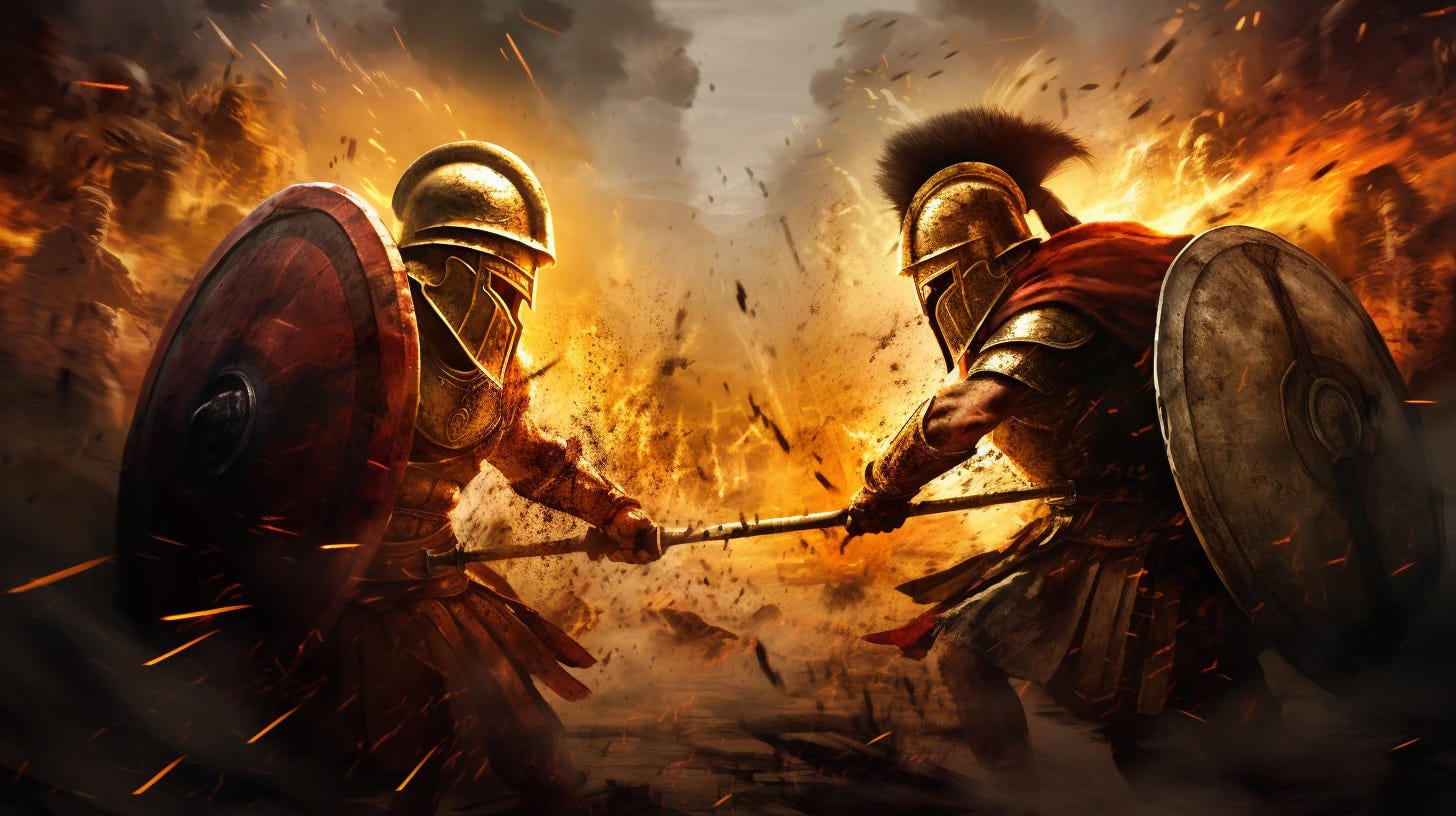Homer has the incredible ability to tell the story of a large battle through individual actions. Armies are not fighting in The Iliad. Individuals are. It’s rare to see this level of battle detail in works of either fiction or non-fiction. So far, Homer has not told of the grand narratives of the battles. Instead, he has told of individuals killing other individuals, by name. Projectiles flung by one group don’t impersonally kill members of the other group. Individuals throw spears at other named individuals. Oftentimes, Homer will also include the victim’s family heritage and place of birth.
Warriors seek out specific warriors on the other side. It’s not mass chaos. It’s directed attack. This feels true in a way that basketball players of the same height and skill level will naturally play against one another while part of a larger team.
By naming individuals, Homer brings an incredible amount of humanity to the war. The battles are exhilarating, but the reader is unable to linger over the violence. One is constantly reminded that these are people with families, not numbered battle fatalities. It’s an incredible way to honor the dead and through the written word, to make them immortal.
In fact, this story has so far been made up of a series of single combats by named combatants. There have been the two actual single combat battles while the armies have stopped to allow Menelaus to fight Paris and later for Hector to fight Ajax. But the larger battles are made of a series of single combat experiences. Sure, Homer is only describing the main killings, but it’s still the major portion of the battle narratives.
Part of this personalization is due to the style of battle. Gunfire, cannon fire, and bombs kill indiscriminately. Older weapons cannot. While bows and arrows are used (and can be indiscriminate), much of the killing has so far been conducted with spears and swords, which require relatively close and personal encounters.
Individuality shows up amidst tragedy in another way when Diomedes (a Greek) and Glaucus (a Trojan) agree not to fight each other based upon a prior guest-friendship between their forefathers. Prior kindness can stay existing hostilities.
—
Diomedes attacks an immortal god (Aphrodite) in Book 5. A line seems to have been crossed. A prophecy by Dione predicts that Diomedes will not return to Greece because he fought against the immortal gods.
This brings up a number of questions. What is the worst thing Diomedes could have done to Aphrodite? Has Diomedes passed a point of no return? Is there any forgiveness for attacking the gods? Is Diomedes a marked man for life? And perhaps the most challenging question and thought experiment of all - can immortal gods be killed?
—
Does Zeus direct the course of action in The Iliad? Or do other gods or even humans?
The start of Book 5 presents an interesting case where Athena asks Ares, “…why not let these mortals fight it out for themselves?” Let Zeus give glory to either side he chooses. We’ll stay clear and escape the Father’s rage.”
It’s fascinating to observe the interplay of human action, immortal intervention, and Zeus’ will. Are these equal in importance or does Zeus hold sway? For the Greeks, a people fiercely dedicated to individual freedom, this question will be fun to explore throughout the remainder of The Iliad.
—
Translation Note:
I’m reading Emily Wilson’s translation of The Iliad and in Book 5, when Aeneas asks Pandarus to attack Diomedes, he speaks of Diomedes:
"...who has already killed so many Trojans and loosed the limbs of many noble men."
The lyric poet Sappho also used this term “limb loosening” in a different context, one of sexual intercourse. Through translating death in this manner, Emily Wilson connects not only Sappho to The Iliad, but also equates sexual intercourse in a way with death. I thought this was brilliant.
(As a fun note, I shared this observation on Twitter and Emily Wilson liked the Tweet, which I’m assuming means that that is indeed what she had in mind).





